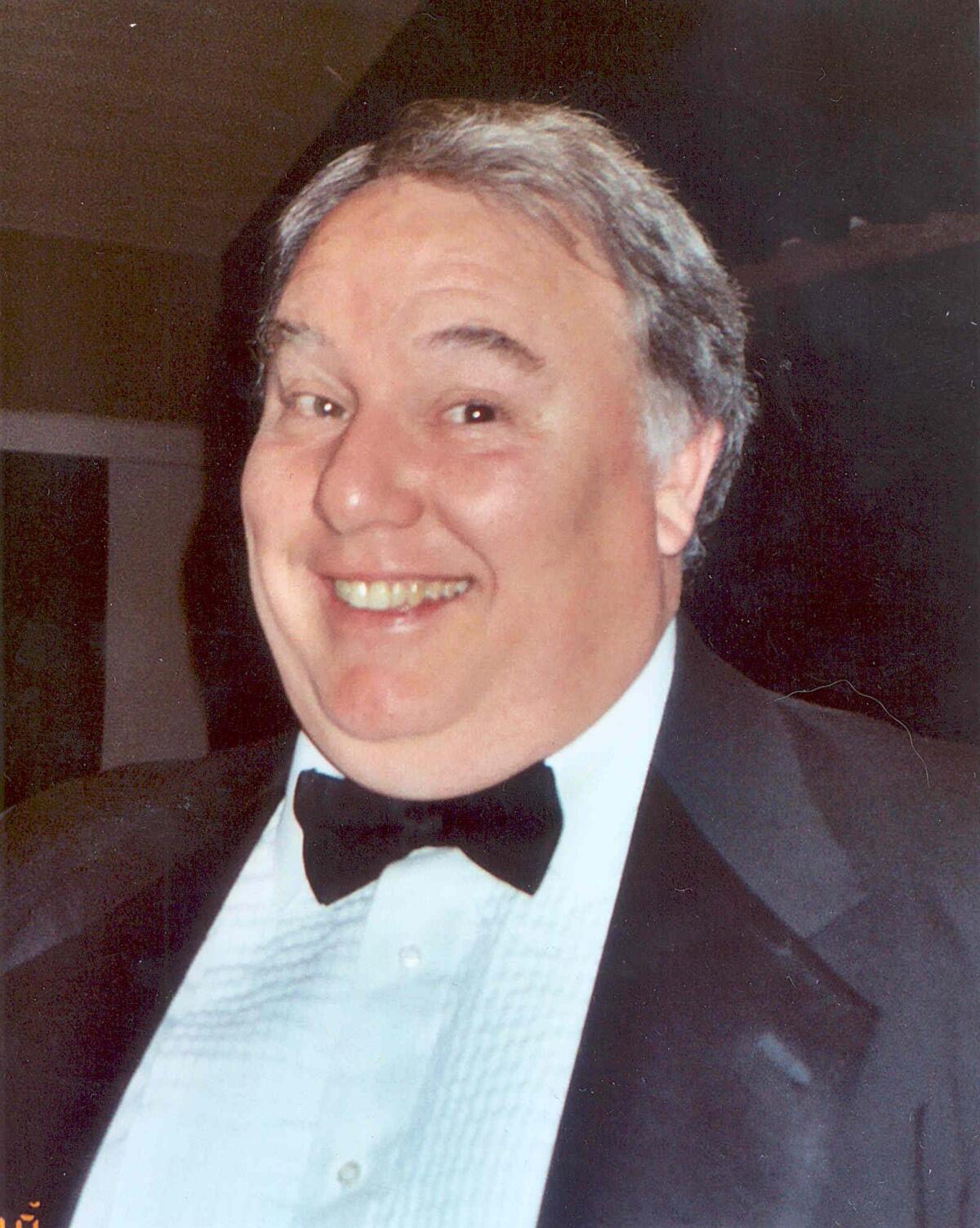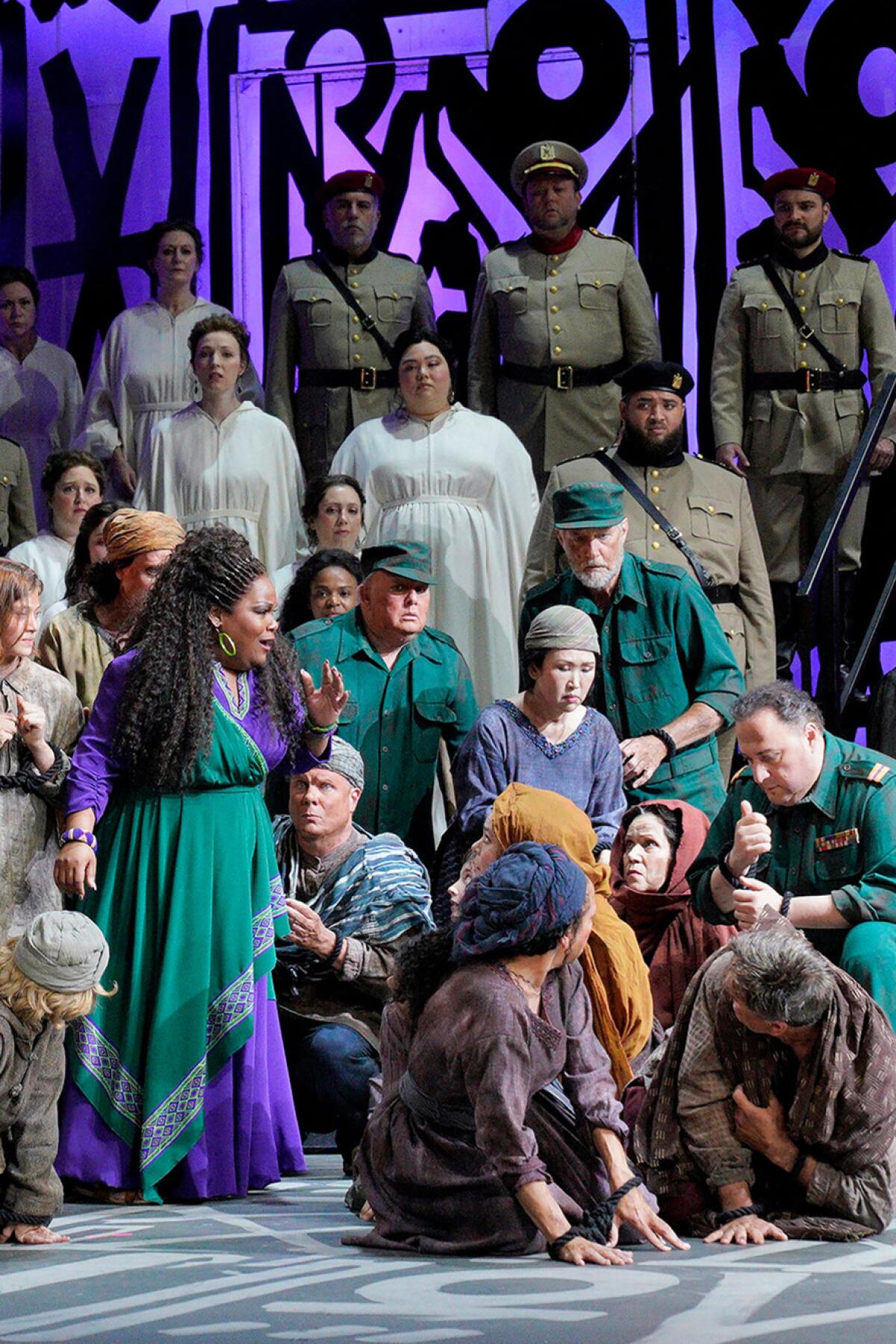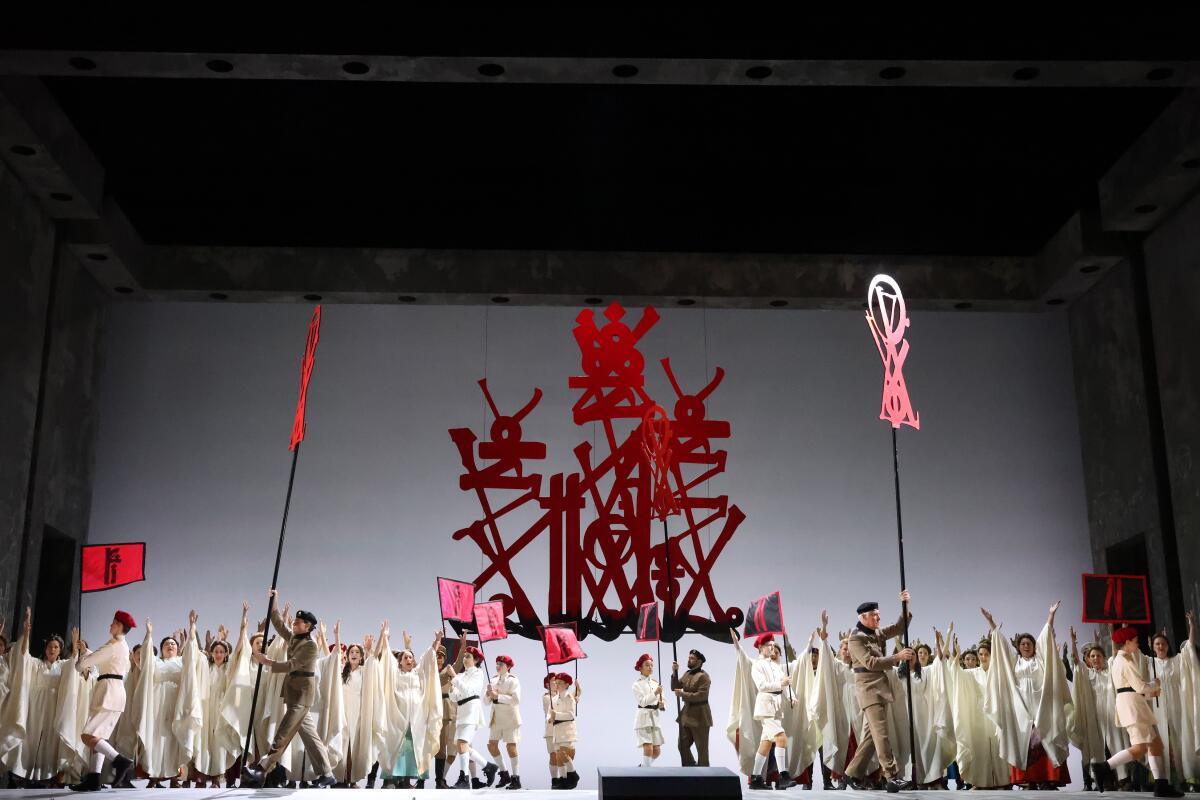This tenor has sung in more than 150 L.A. Opera shows. After ‘Aida,’ he’ll take a final bow

- Share via
When ‘Aida’ closes on June 12, L.A. Opera tenor George Sterne will step down from his post after over 150 productions, more than any other chorus member in the company’s history.
Sterne has been with the L.A. Opera since before there was an L.A. Opera. He’s seen it all: The revolving door of big-name guest directors — Julie Taymor, William Friedkin, Franco Zeffirelli. The divas and dilettantes. He’s taken the spotlight and taken pratfalls. Now, he’s taking his final bow.
For the record:
2:09 p.m. May 28, 2022An incorrect photo and caption of George Sterne was originally posted with this story. The corrected photo has been added, and the caption has been amended.
“I’ll miss the place, miss the people, miss the productions and I’ll miss the music,” he says during a break in between rehearsals for ‘Aida,’ which opened last weekend at the Dorothy Chandler Pavilion. “It will be bittersweet, but I’m ready to retire.” His reason for retiring after this show is mostly practical: “I decided a number of years ago when I got to retirement age, I would retire if it were financially feasible,” he says. “And it seems to be, so I decided to go ahead and do that.”
When Sterne first arrived in L.A. back in 1982, there was no L.A. Opera. There was the L.A. Master Chorale, founded by choral conductor Roger Wagner. Back then, they provided the chorus for visiting opera companies from places such as New York or Berlin.
Then, in late 1985, under the direction of opera administrator Peter Hemmings, L.A. Opera presented three productions by Deutsche Oper Berlin at the Dorothy Chandler Pavilion — “The Marriage of Figaro,” “Tosca” and Korngold’s “Die tote Stadt.” Sterne sang in those shows but missed the company’s inaugural production a year later (“Otello” starring L.A. Opera founding artistic advisor Plácido Domingo), before he finally joined L.A. Opera in its second season. Domingo, who was the L.A. Opera’s general director from 2003 to 2019, resigned three years ago after the organization launched an investigation finding that sexual assault allegations against him were credible.

In the early years, L.A. Opera had no music director but rather a succession of guest conductors, until Kent Nagano was appointed principal conductor in 2001. (The position was later retitled music director.) He was replaced in 2006 by current music director James Conlon. “Nagano is a little more cerebral and, from a personal standpoint, he’s a little bit aloof from both the orchestra and from the chorus,” Sterne says. “Whereas James is actually quite personable, and I think goes out of his way to fraternize with everybody in the company.”
Sterne knew from an early age that he wanted to sing. As a 10-year-old in Tucson, Ariz., he joined the Tucson Boys Chorus. After doing a four-month tour with them throughout North America he remembered thinking, “This might be a cool way to make a living.”
He moved to San Diego when he was in the seventh grade and saw his first opera a year later — Gounod’s “Faust.” The production cemented what he wanted to do for a living. He went on to study voice and choral music at what was then Chapman College (now Chapman University) in Orange County. There he developed his crisp and cutting midrange tenor vocal style.
A member of the Carmel Bach Festival Chorus from 1984 to 2000, he has also sung with Pasadena Classical Singers, Zephyr, I Cantori and the Los Angeles Chamber Singers.
In a career full of highs, Sterne’s also had a few lows — like the production of “The Marriage of Figaro” where he entered Count Almaviva’s chamber at top speed. “On my way in, I lost my footing and I fell on my stomach,” he laughs. “I slid for about 10 feet, and I got up real fast and continued the scene. Everyone said, ‘Are you okay?’ Only my ego has been bruised, everything else is fine.”
Sterne was also present when guest director Franco Zeffirelli, a veteran of Italian opera, allowed the chorus to improvise their own crowd scenes in rehearsals for “Pagliacci.” In stark contrast was Maximilian Schell, whose process Sterne recalls as being so drawn-out and meticulous that the opera had to add rehearsal time on “Der Rosenkavalier” late in the process.
German composer Richard Wagner’s body of work has long been a staple of the company, notably in 2010 when the L.A. Opera went all in on a production of “The Ring Cycle,” a 17-hour Achim Freyer-directed behemoth that cost $32 million.

Around that time, L.A. County Supervisor Mike Antonovich issued a statement calling for an overhaul of the concurring Ring Festival LA, citing the fact that Wagner was antisemitic. “The problem with Wagner is, yeah, he was a real lousy guy and his antisemitism was real. But he was one of the most important and greatest composers in the history of music, and you can’t ignore him,” says Sterne.
Within the company, the gnarled question of what to do with Wagner came up again around this season’s production of “Tannhauser,” and again with Bach’s “St. Matthew Passion,” which depicted antisemite attacks. On the “Tannhauser” program, L.A. Opera included a disclaimer about grappling with Wagner’s racist and antisemitic legacy.
Los Angeles Opera stages a large-scale, four-hour Wagner opera for the first time in years.
For its season finale this year, the opera will premiere director Francesca Zambello’s new-to-L.A. ‘Aida.’ It marks a dodgy season for all performing arts venues everywhere emerging from the pandemic, which are grappling at once with a spike in costs, a decrease in audience attendance and COVID-19 concerns. “The audiences, by and large, have not started coming back yet. So we’re still tapering the houses a lot,” Sterne says. “My guess is they have to be very careful with money.”
The new production of ‘Aida’ features soprano Latonia Moore and tenor Russell Thomas starring as secret lovers from rival kingdoms. L.A. art star RETNA provides the backdrop for this epic staging featuring full chorus, orchestra and ballet.
Next season at the L.A. Opera will see Grammy-winning soprano Angel Blue in “Tosca,” and filmmaker James Grey’s production of “The Marriage of Figaro.” With any luck, audiences will be back in full force and COVID-19 won’t be a lingering threat.
But Sterne won’t be there. Right now, he’s thinking about his upcoming cruise down the Danube with his wife, a retired music history teacher. “I’ll unwind from thirty-four years in the opera company in Vienna,” he says with a sigh. “We’re going to the Staatsoper [the Vienna State Opera]. That will be a great holiday.”
More to Read
The biggest entertainment stories
Get our big stories about Hollywood, film, television, music, arts, culture and more right in your inbox as soon as they publish.
You may occasionally receive promotional content from the Los Angeles Times.










